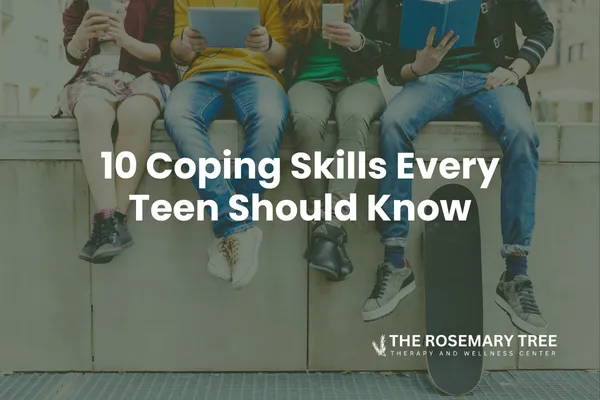
10 Coping Skills Every Teen Should Know
The teenage years can feel overwhelming. School pressure, social changes, family stress, and world events all add up. Without healthy coping strategies, many teens turn to avoidance, isolation, or even harmful behaviors to deal with their emotions.
At The Rosemary Tree, we believe coping skills are learnable tools that help teens regulate their emotions, manage stress, and feel more in control. Here are ten coping skills every teen should know.
1. Deep Breathing
Simple but powerful — slowing down the breath calms the nervous system. Try box breathing: inhale for 4, hold for 4, exhale for 4, hold for 4.
2. Grounding Techniques
When anxiety spikes, grounding brings focus back to the present. Use the 5-4-3-2-1 method: name 5 things you see, 4 you feel, 3 you hear, 2 you smell, 1 you taste.
3. Journaling
Writing down thoughts and feelings can reduce rumination and create perspective. Teens can try gratitude journaling or “brain dumps” before bed to clear their minds.
4. Physical Movement
Exercise isn’t just about fitness — it releases endorphins and helps regulate mood. Encourage teens to walk, dance, stretch, or play a sport they enjoy.
5. Creative Expression
Art, music, and writing provide healthy outlets when words are hard. Art therapy, for example, helps teens explore feelings in non-verbal ways.
6. Mindfulness Practices
Mindfulness means paying attention to the present moment without judgment. Apps, guided meditations, or simple practices like mindful eating can reduce stress.
7. Healthy Self-Talk
Teens often wrestle with a harsh inner critic. Learning to reframe “I can’t” into “I’m learning” builds resilience and confidence.
8. Talking to Someone Trusted
Whether it’s a parent, mentor, or therapist, sharing feelings helps lighten the load. Teens don’t need to figure everything out on their own.
9. Setting Boundaries
Saying no to harmful friendships, toxic online spaces, or overcommitment is a powerful form of self-care.
10. Practicing Gratitude
Focusing on what’s going well helps shift attention from stress to hope. Writing down three things they’re grateful for each day builds positivity over time.
Why Coping Skills Matter
Without healthy coping tools, teens may turn to avoidance, risky behaviors, or withdrawal. Practicing these skills helps them:
Manage stress
Improve focus
Build stronger relationships
Feel more confident and resilient
At The Rosemary Tree, we integrate coping skills training into therapy sessions, helping teens apply these tools in everyday life.
Learn More From Trusted Resources
Final Thoughts
Coping skills aren’t about avoiding hard feelings — they’re about facing them with healthier strategies. The more tools teens have, the more resilient they become. If your teen is struggling, therapy can provide the structure and support to strengthen these skills and create lasting change.


